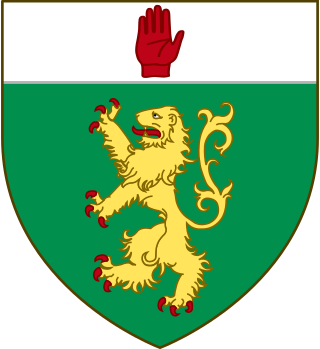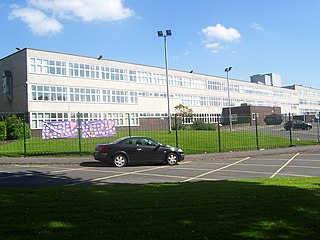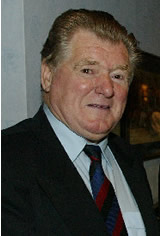Related Research Articles

Motherwell Football Club is a Scottish professional football club based in Motherwell, North Lanarkshire, which plays in the Scottish Premiership. Motherwell have not dropped out of the top-flight of Scottish football since 1985, and have lifted one trophy in that time – the Scottish Cup in 1991.

Wishaw Football Club is a Scottish football club based in the town of Wishaw, North Lanarkshire. The club currently competes in the West of Scotland League Second Division.
Robert White Murdoch was a Scottish professional footballer, who played for Celtic, Middlesbrough and Scotland. Murdoch was one of the Lisbon Lions, the Celtic team who won the European Cup in 1967. He later managed Middlesbrough.

McGuinness is an Irish surname. It derives from and is an anglicized form of the Gaelic Mac Aonghuis, literally meaning "son of Angus". It may also denote the name Mac Naois.

Our Lady's High School is a Roman Catholic secondary school for 11- to 18-year-olds in Motherwell, North Lanarkshire, that is close to Fir Park stadium. The school educates around 675 pupils. The headteacher is Mrs Louisa McGraw.
Robert Evans was a Scottish football player and manager, most notable for his time with Celtic.
The Bluebells are a Scottish indie new wave band, active between 1981 and 1986.

Robert Brown Clark is a Scottish football player and coach. Clark, who played as a goalkeeper, spent most of his playing career with Aberdeen. He also played for Queen's Park, Washington Whips, San Antonio Thunder and Clyde. Clark played 17 times for Scotland and represented the Scottish League. He later became a coach, mainly working in New Zealand and the United States.

Bobby Shearer was a Scottish professional football player and manager. Shearer represented Scotland in four full international games.
The 1980–81 British Home Championship was the only British Home Nations international football championship, other than the years of the First World War and Second World War, which was not completed and thus failed to produce a winner. As with the rugby union 1972 Five Nations Championship the cause of this cancellation was The Troubles in Northern Ireland. The championship was scheduled to be played in May 1981 after the end of the domestic season. On 5 May, however, the Provisional Irish Republican Army hunger strike leader Bobby Sands died in the Maze Prison, invoking a storm of protest and violence by republicans in Northern Ireland. Thus the English and Welsh FAs, whose teams were scheduled to travel to Windsor Park later in the month, declined to play, rendering the tournament incomplete and void.
The 1971–72 British Home Championship was the first such Home Nations football tournament, to suffer during The Troubles in Northern Ireland, when death threats from the Provisional Irish Republican Army were sent to the Scottish Football Association and Scottish players who were scheduled to play at Windsor Park. The surge in anti-British feeling which prompted these threats followed Bloody Sunday in January, and also resulted in the cancellation of the rugby union 1972 Five Nations Championship. As a result, Northern Ireland's home fixture was rescheduled to Hampden Park, effectively granting the Scottish team an extra home match. This was not the last time that The Troubles would interfere with the Home Championship; the 1981 British Home Championship would have to be abandoned following similar heightened tension after the death of Bobby Sands.
The 1975–76 British Home Championship was a football tournament played between the British Home Nations at the end of the 1975–76 season. It resulted in an outright Scottish victory following a rare whitewash of all three opponents, including England in a tough final at home in Glasgow. Scotland again refused to travel to Northern Ireland and therefore gained an additional home match. The Scottish team of the middle of the 1970s was one of the best sides the nation has ever fielded, being the only British team to qualify for a major championships between 1971 and 1980. They began well, beating Wales, who also lost to England in the early exchanges. Both title contenders then inflicted heavy defeats on Northern Ireland and both went into the final match looking for a win, as a draw would result in a disappointing tie for first place. The match was full of incident, but the Scots eventually ran out 2–1 winners, taking the cup outright for the first time since the 1967 British Home Championship, when England were World Champions. The Welsh gained some consolation, defeating Northern Ireland in their final match to take third place.
The 1973–74 British Home Championship Home Nations football tournament was, like the two championships which preceded it, subject to rescheduled matches due to The Troubles in Northern Ireland. Scotland, who should have visited Belfast to play their match against Northern Ireland, instead hosted the game in Glasgow as the previous years solution of matches being played in Liverpool was not taken up. Bereft of home advantage, the Irish struggled to contain their opponents, although they did begin well with a narrow win over the Scots. In their first matches, England enjoyed their home advantage to claim victories over the Welsh and Irish while the Welsh crashed to defeat against England and Scotland. With the confusing schedule, by the final match England seemed to be favourites, only needing a draw with the Scots in Glasgow to claim the championship while a loss would still tie the series. The Northern Irish, who could still have sneaked the championship themselves, lost a close game to the Welsh, leaving England and Scotland to battle for the final placements, the Scots reaching parity in the competition thanks to a 2–0 victory.
The 1960–61 British Home Championship international football tournament saw a series of high scoring games, with 40 goals scored in just six matches - a ratio of 6.66 goals per game. England took the British title after a final match at Wembley in which they put nine goals past Scotland, who returned with three of their own. Teams in this period frequently fielded as many as five strikers, hoping to outscore opponents rather than rely on heavy defence. This tactic paid dividends, particularly for England, whose haul of 19 included seven for Jimmy Greaves, whilst both Bobby Charlton and Bobby Smith each scored in each of England's three games.
The 1972–73 British Home Championship international Home Nations football tournament was, like its predecessor in 1972, a victim of The Troubles in Northern Ireland which had erupted following Bloody Sunday the previous year. As with the previous year in the rugby union 1972 Five Nations Championship, threats were made by Republican activists against visiting British teams, which in this year meant England and Wales. To prevent violence but keep the tournament running, Northern Ireland's "home" games were transferred to Goodison Park, the home of Everton F.C. in Liverpool in England. This step meant that Ireland played just a short ferry ride from Belfast in a city with a substantial Irish population, but where the police were able to exercise a greater measure of control over who was able to attend.
John Livingstone "Ian" McMillan is a Scottish former footballer who played for Airdrieonians, Rangers and the Scotland national team.
References
- ↑ "Bobby McGuinness". Barry Hugman's Footballers. Retrieved 30 April 2017.